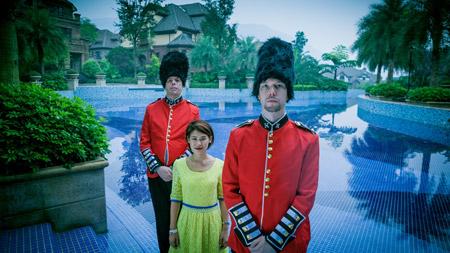In 2012 David Borenstein was a young American living in China, having come to the end of a study scholarship and taking "every odd job that came my way." As a westerner who could speak fluent Chinese, and hence regarded as a "novelty" by the Chinese media, these included appearances on several TV programmes, among them a dating show and the Tibetan version of American Idol.
But the strangest of these odd jobs happened to chime with his desire to make a documentary about the subject of his studies, Chinese urbanisation. The result is "Dream Empire," which offers an insider's view and an outsider's perspective on what Borenstein calls "the biggest building boom in human history."
The Danish-produced film actually charts the transition from boom to bubble, as symbolised by China's "ghost cities," vast and grandiose developments in remote locations that are too expensive for most Chinese people and remain eerily empty – bizarre reminders of property speculation run amok.
White Monkey
When Borenstein arrived in China in 2009, on a Fulbright scholarship, China's property development was already underway, and home ownership had become a national obsession. At the start of his shoot in 2012, it was at its height. As the director observes in his voice-over narration, China would "use more concrete in two years than the US in the whole of the 20th century."
Enter Yana Yang, one of thousands of Chinese to migrate from the countryside into the cities in search of what president Xi Jinping calls the "Chinese dream." Borenstein meets her in Chongqing, the glittering, fast-growing metropolis in the south west of the country, where she has started a foreign talent agency, mostly helping real estate developers market their new cities.
Yana and her partner Jimmy find and provide international acts – singers, musicians, dancers, models – for entertainment on sales days and when potential investors or political leaders visit the developments. Why? Because the Chinese believe that an "international" city is synonymous with success.
Few of these performers are professionals; instead, Yana transforms a ragtag band of students, backpackers and drifters into supposed stars. The foreigners refer to themselves as "white monkeys." Borenstein is recruited as one of these. In front of the camera we see him performing as a "celebrated clarinettist" in a number of bands. Behind the camera, the self-taught filmmaker is constructing his film.
DREAM EMPIRE. Few of the performers doing the gigs on sales days are professional. Photo: Lars Skree
"I had two motivations to do the gigs with Yana," he says. "Firstly, they were good money, which meant I was able to support myself. Secondly, I wanted to dive deeper into this phenomenon, and performing as a white monkey took me to countless new cities throughout the Sichuan province and beyond. My experience with Yana's company is probably the biggest reason I can claim any expertise in Chinese urbanisation."
A Brewing Bubble
Shot primarily between 2012 and 2014, the film follows Yana, Jimmy and their entertainers in the "city image" industry – her efforts to build the business, the distinctly amateurish performances, as well as associated characters and their stories.
Among these is a developer and smiling megalomaniac bragging that an entire city "is all mine," contrasted with distraught villagers whose homes have been demolished to make way for a themed city called Britishville.
The film also observes the growing reality that no one is moving to these outlandish developments. As Borenstein notes in his unobtrusive, well-judged commentary, "When the shows are over, the new cities become dark."
While we might assume that the director was discovering the story as he shot –


